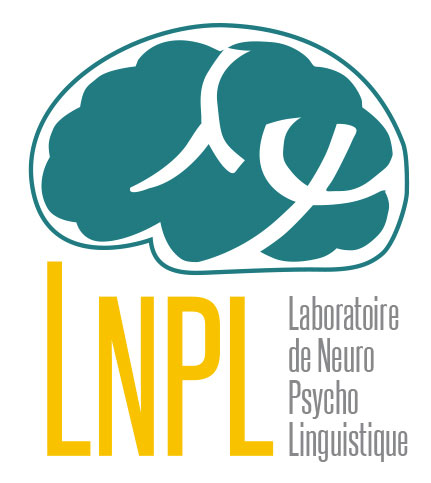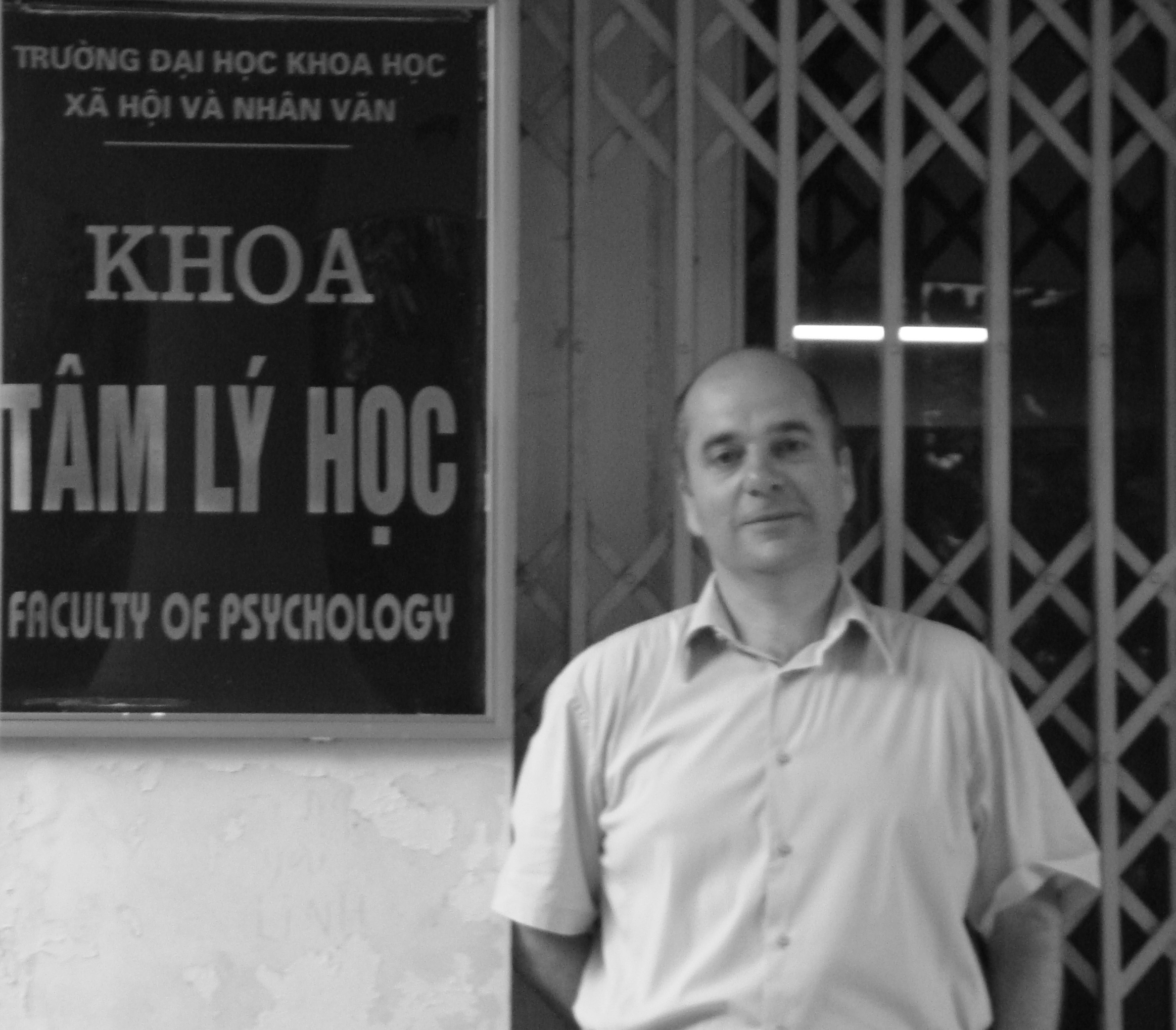-
Partager cette page
Pierre LARGY
Professor in Developmental PsychologyContact details
- Address
- Octogone-Lordat / Maison de la Recherche / bureau E 1.16 / Université Toulouse - Jean Jaurès / 5 allées Antonio Machado / 31058 TOULOUSE Cedex 9
- Office
- E 1.16
- Phone
- 05 61 50 35 32
- largy@univ-tlse2.fr
Taught academic discipline(s)
- psychologie of cognitive development;
- psychology of language;
- psychologie of learning;
- methodology;
- statistics.
Institutions:
- UFR of Psychology and UFR SES (University of Toulouse Jean Jaurès) ;
- ESPE Midi-Pyrénées ;
- University of Geneva (Switzerland) ;
- University of Social Sciences and Humanities (Vietnam)
Research topics
I initially focused my research on the acquisition and application of simple rules such as the production of plural verbs and nouns. On the basis of a model that focused on the way adults (experts) produce plural inflections, I studied the nature of the processes used when
children (novices - learners) produce these inflections to gradually reach this expertise.
These findings allowed me formulating new hypotheses on the reasons that may explain the origins of some learning disabilities. Afterwards, I expanded the parameters of "spelling-written production" research to focus on the "spelling-reading" relation. I consequently tested the hypothesis of an implicit learning disorder in dyslexic children.
More recently, I have increased the scope of my research to focus on SMS (Short Message Service) and Digital Writing in Instant Messaging (DWIM) to better understand the cognitive processes involved in written production and reading.
children (novices - learners) produce these inflections to gradually reach this expertise.
These findings allowed me formulating new hypotheses on the reasons that may explain the origins of some learning disabilities. Afterwards, I expanded the parameters of "spelling-written production" research to focus on the "spelling-reading" relation. I consequently tested the hypothesis of an implicit learning disorder in dyslexic children.
More recently, I have increased the scope of my research to focus on SMS (Short Message Service) and Digital Writing in Instant Messaging (DWIM) to better understand the cognitive processes involved in written production and reading.
Methods:
- Experimental approach (misspelling induction; added task; double task paradigm ; chronometric analysis; target tracking; corpus analysis)
- Behavioral indicators (misspellings categories; misspellings percentage; reaction times; break; rate)
Populations investigated:
- Children with regular school results (French primary and secondary school, i.e. from 1st to 9th US grade)
- Children with writing learning disorders
- Adults (literate vs. illiterate)
Activities / Resume
Selected publications (CV in pdf) :
Books
- Allal, L., Chanquoy, L., & Largy, P. (2004). Revision: Cognitive and Instructional Processes. Dordrecht: Kluwer Academic Publishers.
Papers in peer-reviewed journals:
- Gunnarsson-Largy, C., Derby, N. & Largy, P. (2019). How do L2 learners and L1 writers differ in their reliance on working memory during the formulation subprocess? Reading and Writing. First Online: 25 February, https://doi.org/10.1007/s11145-019-09941-y
- Largy, P. (2018). De l’auto-évaluation de l’état émotionnel du jeune enfant : l’échelle AEJE. A.N.A.E., 155, 461-469.
- Gunnarsson-Largy C. & Largy, P. (2018). Effet de l’émotion sur la production orthographique d’adultes FL1 et FL2. A.N.A.E., 155, 445-452.
- Largy, P., Simoës-Perlant, A. & Soulier, L. (2018). Effet de l'émotion sur l'orthographe d'élèves d'école primaire. Varia: Revue suisse des sciences de l'éducation, 40(2), 1-26.
- Simoës-Perlant, A., Gunnarsson-Largy, C., Lanchantin, T. & Largy, P. (2018). Instant messaging: a threat for poor spellers whose spelling is in the process of being consolidated. Interacções, 48, 21-48.
- Soulier, L., Largy, P., & Simoës-Perlant, A. (2017). L’effet d’une induction émotionnelle par la musique sur la production des accords nominal et verbal : étude chez l’enfant d’école primaire. L’Année psychologique, 117 (4), 405-431.
- Benintendi, S., Simoës-Perlant, A., Lemercier, C. & Largy, P. (2017). Effet d’une induction émotionnelle par la couleur sur l’attention d’enfants typiques de 4 à 11 ans. A.N.A.E., 145.
- Bosse M-L, Chaves N., Largy P. & Valdois, S. (2015). Orthographic learning during reading: the role of whole word visual processing. Journal of Research in Reading, 38, 141-158.
- Lanchantin, T., Simoës-Perlant, A. & Largy, P. (2014). Good spellers write more textism than bad spellers in instant messaging: The case of French. PsychNology Journal, 12(1-2), 45-63.
- Lanchantin, T., Simoës-Perlant, A., & Largy, P. (2013). The case of Digital Writing in Instant Messaging: When cyber written productions are closer to oral code than to written code. PsychNology, 10(3), 187-214.
- Simoës-Perlant, A., Loury, F., Largy, P., Gunnarsson-Largy C, Soum-Favaro, C. (2013). L’effet de la liaison en production écrite chez l’enfant dyslexique et normo-lecteur. A.N.A.E., Revue de Neuropsychologie du Développement et des Apprentissages, 124, 327-333.
- Chaves, N., Combes C., Largy, P. & Bosse, M-L., (2012). La mémorisation de l’orthographe des mots lus en CM2 : effet du traitement visuel simultané. L’Année Psychologique, 112, 2, 175-196
- Combes, C., Volckaert-Legrier, O., & Largy, P. (2012b). Automatic or Controlled Writing? The Effect of a Dual Task on SMS Writing in Novice and Expert Adolescents. SMS Communication: A Linguistic Approach, 35(2), 199-217. doi: 10.1075/li.35.2.05com
- Simoës-Perlant, A., & Largy, P. (2011). Are implicit learning abilities sensitive to the type of material to be processed? Study on children with and without dyslexia. Journal of research in reading. 34(3), 298–314. doi: 10.1111/j.1467-9817.2010.01464.x
- Chaves N., Bosse M-L. & Largy P. (2010). Le traitement visuel est-il impliqué dans l'apprentissage de l'orthographe ? ANAE, 107-108, 133-141.
- Dujardin, T., Etienne, Y., Constentin, C., Bernard C., Largy, P., Mellier, D., Lalonde, R., & Rebaï, M. (2010). Behavioral performances in participants with phonological dyslexia and different patterns on the N170 component. Brain and Cognition.
- Simoës-Perlant, A., Largy, P. (2010). L’apprentissage implicite : utilisation d’une tâche de temps de réaction séquentiel chez l’enfant présentant des troubles du langage écrit. A.N.A.E., Revue de Neuropsychologie du Développement et des Apprentissages, 107-108, 151-158.
- Largy, P. (2008). L’acquisition de la morphologie flexionnelle du nombre : hypothèses sur l’origine de certaines difficultés d’apprentissage de l’écrit. A.N.A.E., Revue de Neuropsychologie du Développement et des Apprentissages, 96-97, 213-219.
- Largy, P., Cousin, M.P., Bryant, P., & Fayol, M. (2007). When memorized instances compete with rules: the case of number-noun agreement in written French. Journal of Child Language, 34, 425-437.
- Largy, P. (2006). Orthographe et illusions. Cahiers pédagogiques, 440, 18-20.
- Largy, P., Cousin, M.P., & Dédéyan, A. (2005). Produire et réviser la morphologie flexionnelle du nombre : de l’accès à une expertise. Psychologie Française, 50, 339-350.
- Largy, P., Cousin, M.P., Dédéyan, A., & Fayol, M. (2004). Comprendre comment l’enfant apprend : une étape vers la compréhension des effets des pratiques pédagogiques. Revue Française de Pédagogie, 148, 37-45.
- Largy, P., Dédéyan, A., & Hupet, M. (2004). Orthographic revision : A developmental study of how novice and expert writers detect subject-verb agreement errors in written texts. British Journal of Educational Psychology, 74, 533-550.
- Simon, G., Bernard, C., Largy, P., Lalonde, R., & Rebaï, M. (2004). Chronometry of visual word recognition during passive and lexical decision tasks: an ERP investigation. International Journal of Neuroscience, 114, 1401-1432.
- Largy, P. (2003). Du contrôle de l’orthographe grammaticale. 1re partie: du contrôle pré-graphique. Le Langage et l’Homme, 38, 139-152.
- Largy, P., & Dédéyan, A. (2002). Automatisme en détection d'erreurs d'accord sujet-verbe: étude chez l'enfant et l'adulte. L'Année Psychologique, 102, 201-234.
- Largy, P. (2001). La révision des accords nominal et verbal chez l’enfant. L'Année Psychologique, 101, 221-245.
- Largy, P., & Fayol, M. (2001). Oral cues improve subject-verb agreement in written French. International Journal of Psychology, 36 (2), 121-132.
- Largy, P., Fayol, M., & Lemaire, P. (1996). The homophone Effect in Written French : The Case of Verb-Noun Inflection Errors. Language and Cognitive Processes, 11 (3), 217-255.
Additional information
Book chapters:
- Largy, P., Totereau, C. & Gunnarsson-Largy, C. (2018). Apprendre le marquage du pluriel. In L. Ferrand, B. Lété, & C. Thevenot (Eds.), Psychologie Cognitive des Apprentissages Scolaires. Paris : Dunod.
- Combes, C., Volckaert-Legrier, O., & Largy, P. (2014). Automatic or controlled writing? The effect of a dual task on writing in novice and expert adolescents. In L.-A. Cougnon & C. Fairon (Eds.) SMS communication: a linguistic approach. Amsterdam: John Benjamins.
- Gunnarsson-Largy, C. & Largy, P. (2013). Le développement des automatismes en production écrite du CE2 à la 4e collège à travers l’accord de proximité et les récupérations d’instances, dans C. Gunnarsson-Largy & E. Auriac-Slusarczyk, (Eds) Ecriture et réécritures chez les élèves : Un corpus à la croisée entre des genres discursifs et des méthodologies d’analyse. Louvain-la-Neuve : Academia Bruylant.
- Largy, P., Simoës-Perlant, A. & Gunnarsson-Largy C. (2013). Quels sont les processus en jeu dans la révision orthographique ? : Comparaison novices – experts en révision de texte narratif, dans C. Gunnarsson-Largy & E. Auriac-Slusarczyk, (Eds) Ecriture et réécriture chez les élèves. Un seul corpus, divers genres discursifs et méthodologies d’analyse (pp. 113-128). Louvain-la-Neuve : Academia Bruylant.
- Soum-Favaro, C., Gunnarsson, C., Simoës-Perlant, A. & Largy, P. (2013). La Liaison à l’interface entre l’oral et l’écrit. In C. Soum, A. Coquillon & J-P. Chevrot (Eds), La liaison : approches contemporaines (pp. 141-168), Bruxelles : Peter Lang.
- Soum-Favaro, C., Gunnarsson, C. & Largy, P. (2013). Le traitement de la liaison en production écrite. dans Ledegen (Ed.), /Les variations du français dans les espaces créolophones et francophones. France, Europe, Amérique/ (pp. 49-66 Tome 1). Paris: L'Harmattan.
- Gunnarsson, C. & Largy, P. (2010). Confrontation de données expérimentales à l’analyse d’un corpus : le cas de la récupération d’instances en production écrite. Synergies Pays Scandinaves, 5, 49-64.
- Mesquida, C., Largy P., Soum-Favaro, C., & Gunnarsson, C. (2010). Lorsque qu’une liaison prénominale gène puis facilite la production du pluriel des noms chez l’enfant. Synergies Pays Scandinaves, 5, 113-121.
- Largy, P. (2008). De la perméabilité de la syntaxe : le cas de l’accord sujet-verbe. In C. Brissaud, J.-P. Jaffré et J.-C. Pellat (Eds.) Nouvelles recherches en orthographe, Limoges, Editions Lambert Lucas.
- Largy, P. (2006). Orthographe et illusion. Cahiers pédagogiques, 440, 18-20.
- Largy, P., & Cousin, M.P. (2004). Apprendre implicitement le -s du pluriel des noms. In A. Piolat (Ed.), Ecriture : approches en sciences cognitives (pp. 110-122). PUP.
Expertise and reseach valorisation
• Expertises for the European Commission, the French Education Ministry, of Loisir et du Sport du Québec and for the Quebec Research Foundation, Society and culture (research programm on writing and reading).
• Reviews of articles (e.g., Current Psychology Letters: Behaviour, Brain & Cognition; l'Année Psychologique ; Psychologie française ; Language and Cognitive Processes ; British Journal of Educational Psychology ; Revue des Sciences de l’Education ; Rééducation Orthophonique).
• Organisation, together with Aurélie Simoës-Perlant (UTM), of the conference « Les troubles du langage écrit : de l’enfance à l’âge adulte», Maison de la Recherche, Université Toulouse le Mirail, 16-17 mars 2012.
• Organisation, together with Marie-Line Bosse (UTM), of the conference « Les troubles du langage écrit chez l’enfant : de la théorie à la pratique », (750 participants),Maison de la Recherche, Université Toulouse le Mirail, 14-15 mars 2008.
• Reviews of articles (e.g., Current Psychology Letters: Behaviour, Brain & Cognition; l'Année Psychologique ; Psychologie française ; Language and Cognitive Processes ; British Journal of Educational Psychology ; Revue des Sciences de l’Education ; Rééducation Orthophonique).
• Organisation, together with Aurélie Simoës-Perlant (UTM), of the conference « Les troubles du langage écrit : de l’enfance à l’âge adulte», Maison de la Recherche, Université Toulouse le Mirail, 16-17 mars 2012.
• Organisation, together with Marie-Line Bosse (UTM), of the conference « Les troubles du langage écrit chez l’enfant : de la théorie à la pratique », (750 participants),Maison de la Recherche, Université Toulouse le Mirail, 14-15 mars 2008.
Principal responsabilities since 2004 :
• Directeur de l’IUFM Midi-Pyrénées
• Directeur de l’UFR de Psychologie de l’Université de Toulouse 2 le Mirail
• Directeur du Département de Psychologie du Développement
• Membre du Conseil d’Administration de l’Université
• Membre de la Commission des Finances de l’Université Toulouse 2 le Mirail
• Président de la Section Disciplinaire pour les usagers de l’Université de Toulouse le Mirail


